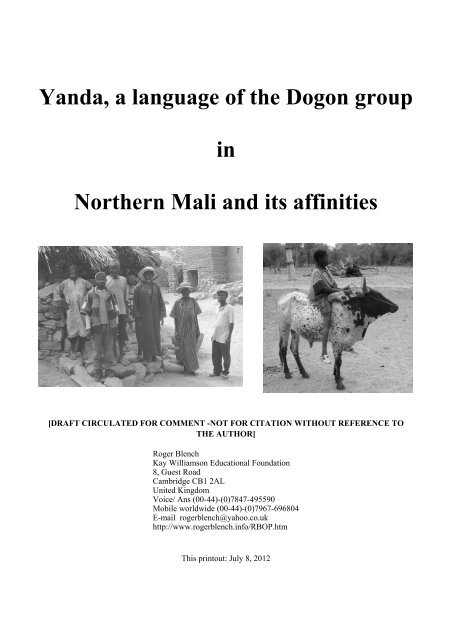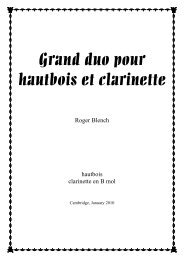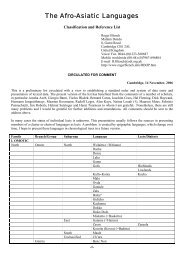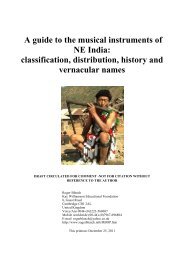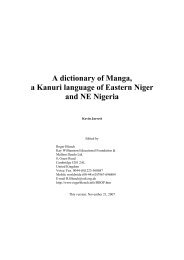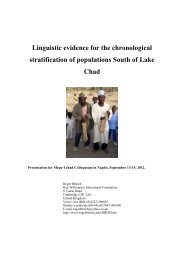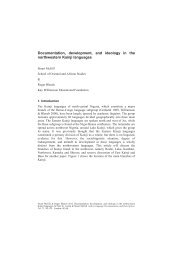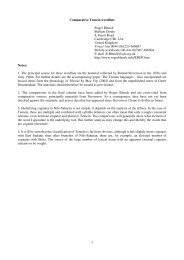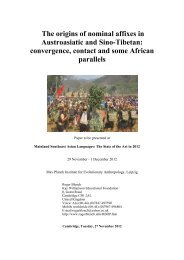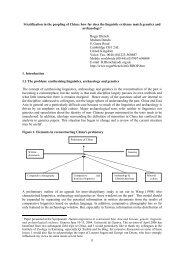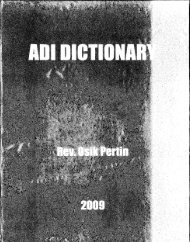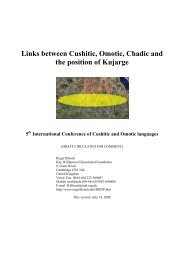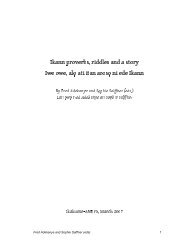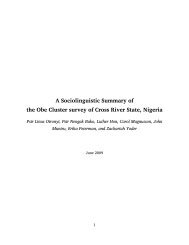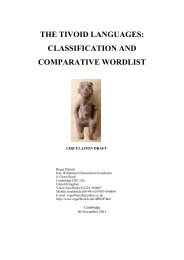Yanda, a language of the Dogon group in Northern ... - Roger Blench
Yanda, a language of the Dogon group in Northern ... - Roger Blench
Yanda, a language of the Dogon group in Northern ... - Roger Blench
You also want an ePaper? Increase the reach of your titles
YUMPU automatically turns print PDFs into web optimized ePapers that Google loves.
<strong>Yanda</strong>, a <strong>language</strong> <strong>of</strong> <strong>the</strong> <strong>Dogon</strong> <strong>group</strong><br />
<strong>in</strong><br />
Nor<strong>the</strong>rn Mali and its aff<strong>in</strong>ities<br />
[DRAFT CIRCULATED FOR COMMENT -NOT FOR CITATION WITHOUT REFERENCE TO<br />
THE AUTHOR]<br />
<strong>Roger</strong> <strong>Blench</strong><br />
Kay Williamson Educational Foundation<br />
8, Guest Road<br />
Cambridge CB1 2AL<br />
United K<strong>in</strong>gdom<br />
Voice/ Ans (00-44)-(0)7847-495590<br />
Mobile worldwide (00-44)-(0)7967-696804<br />
E-mail rogerblench@yahoo.co.uk<br />
http://www.rogerblench.<strong>in</strong>fo/RBOP.htm<br />
This pr<strong>in</strong>tout: July 8, 2012
R.M. <strong>Blench</strong> <strong>Yanda</strong> Wordlist Circulated for comment<br />
TABLE OF CONTENTS<br />
1. Introduction.......................................................................................................................................................2<br />
2. Location, history and sociol<strong>in</strong>guistic situation ...............................................................................................2<br />
2.1 Nomenclature ..............................................................................................................................................2<br />
2.2 Location and settlements............................................................................................................................2<br />
2.3 Language status...........................................................................................................................................3<br />
2.4 <strong>Yanda</strong> culture and history..........................................................................................................................3<br />
2.5 The classification <strong>of</strong> <strong>Yanda</strong> ........................................................................................................................3<br />
3. Phonology ..........................................................................................................................................................3<br />
3.1 Vowels ..........................................................................................................................................................3<br />
3.2 Consonants ..................................................................................................................................................4<br />
3.3 Tones ............................................................................................................................................................4<br />
4. Morphology .......................................................................................................................................................5<br />
4.1 Nouns............................................................................................................................................................5<br />
5. <strong>Yanda</strong> wordlist ..................................................................................................................................................5<br />
TABLES<br />
Table 1. GPS-determ<strong>in</strong>ed locations <strong>of</strong> <strong>Yanda</strong> settlements......................................................................................3<br />
i
R.M. <strong>Blench</strong> <strong>Yanda</strong> Wordlist Circulated for comment<br />
1. Introduction<br />
This is an annotated wordlist <strong>of</strong> <strong>the</strong> <strong>Yanda</strong> <strong>language</strong>, part <strong>of</strong> <strong>the</strong> <strong>Dogon</strong> <strong>group</strong>, spoken <strong>in</strong> nor<strong>the</strong>rn Mali. The<br />
wordlist was collected from a <strong>group</strong> <strong>of</strong> villagers <strong>in</strong> <strong>Yanda</strong> on <strong>the</strong> 4th and 5 th <strong>of</strong> March 2005. The <strong>in</strong>formants<br />
were;<br />
Informants:<br />
Ambozo Kɔlmatele<br />
Pireme Teniberetele<br />
Kanda Amatele<br />
all over sixty years. I would like to thank <strong>the</strong>m for <strong>the</strong>ir patience as <strong>the</strong> elicitation sessions were long and<br />
sometimes passed through several <strong>language</strong>s.<br />
The wordlist was collected as a ‘one-shot’ exercise and <strong>the</strong> transcription must <strong>the</strong>refore be regarded as<br />
prelim<strong>in</strong>ary. This analysis was prepared by <strong>Roger</strong> <strong>Blench</strong>, who added <strong>the</strong> comparative observations 1 . This<br />
document is be<strong>in</strong>g circulated to scholars for comment.<br />
2. Location, history and sociol<strong>in</strong>guistic situation<br />
2.1 Nomenclature<br />
The <strong>Yanda</strong> <strong>language</strong> is known as <strong>Yanda</strong> Dom and its speakers as <strong>Yanda</strong> Bɔlɔm. There is no <strong>of</strong>ficial name<br />
for this <strong>group</strong>.<br />
2.2 Location and settlements<br />
The <strong>Yanda</strong> live <strong>in</strong> a series <strong>of</strong> <strong>in</strong>terconnected settlements on and at <strong>the</strong> foot <strong>of</strong> <strong>the</strong> escarpment, south <strong>of</strong><br />
Bamba, on <strong>the</strong> <strong>Dogon</strong> Plateau <strong>in</strong> Nor<strong>the</strong>rn Mali. Adm<strong>in</strong>istratively, <strong>the</strong>y are located;<br />
Région Cercle Arrondissement<br />
Mopti Koro Diankabou<br />
The named sections <strong>of</strong> <strong>the</strong> <strong>Yanda</strong> recorded by this survey were as follows;<br />
<strong>Yanda</strong> Suŋgu ɔgɔl pepey Yantεmbε Dεnεlu<br />
Turgo ɔgɔl andey Yantεmbε Dεŋtiŋa<br />
G<strong>in</strong>εndyε Kɔmma Yantεmbε Damza<br />
ɔgɔl ɔŋgɔ Nyimbε Yantεmbε Kulma<br />
Kɔŋgɔl Dɔnnɔ<br />
Yantεmbε Togu<br />
Hochstetler et al. (2004) say ‘<strong>Yanda</strong>-dom is spoken <strong>in</strong> a small <strong>group</strong> <strong>of</strong> villages at <strong>the</strong> bottom <strong>of</strong> <strong>the</strong> cliff<br />
near Bamba. The villages are: Anana, Ante, Diankabou, Gu<strong>in</strong>edie, Ogol, Omna, Tourougo, and Yadasongo.’<br />
Some <strong>of</strong> <strong>the</strong>se can be identified with <strong>the</strong> names <strong>in</strong> <strong>the</strong> table above. Ana is a village where a dist<strong>in</strong>ct lect is<br />
spoken related to both <strong>Yanda</strong> and Tebul. Table 1 shows <strong>the</strong> locations <strong>of</strong> <strong>the</strong>se ‘<strong>of</strong>ficial’ settlements as<br />
recorded by GPS;<br />
1 The author is grateful to <strong>the</strong> Swiss Ethno-archaeological project for provid<strong>in</strong>g fund<strong>in</strong>g for this survey.<br />
2
R.M. <strong>Blench</strong> <strong>Yanda</strong> Wordlist Circulated for comment<br />
Table 1. GPS-determ<strong>in</strong>ed locations <strong>of</strong> <strong>Yanda</strong> settlements<br />
Official name Local name N W<br />
Diankabou 14:35:00 3:05:00<br />
Gu<strong>in</strong>e'die' 14:39:10 3:08:40<br />
Ogol Owalpe'pe' 14:39:10 3:09:50<br />
Tourougo 14:39:25 3:08:20<br />
Yadasongo 14:39:45 3:08:00<br />
Ante' Onggo 14:39:00 3:09:50<br />
Omna Komma 14:39:40 3:10:10<br />
Source: Hochstetler et al. (2004)<br />
As to population, Calame-Griaule (1956:67) says, ‘il est parlé par mo<strong>in</strong>s de 2.000 <strong>Dogon</strong> dans une partie<br />
des cantons de Gondo-Séno Foulbés et Bamba (villages de <strong>Yanda</strong>).’ Hochstetler et al. (2004) give a figure<br />
from <strong>the</strong> population census <strong>of</strong> 1987 as 1400 and extrapolated this to 1998 to give a figure <strong>of</strong> 1600. Assess<strong>in</strong>g<br />
<strong>the</strong> population is not easy. <strong>Yanda</strong> settlements are all small and <strong>in</strong>terconnected. The <strong>Yanda</strong> used to live <strong>in</strong><br />
villages set <strong>in</strong>to <strong>the</strong> cliff-face itself and <strong>the</strong>re are still some houses <strong>the</strong>re; however, most villages are<br />
established at <strong>the</strong> bottom <strong>of</strong> <strong>the</strong> cliff. Visual observation suggests a figure <strong>of</strong> 2-3000.<br />
2.3 Language status<br />
The <strong>Yanda</strong> <strong>language</strong> is presently be<strong>in</strong>g transmitted to <strong>the</strong> children. The second <strong>language</strong> <strong>of</strong> <strong>Yanda</strong> speakers<br />
is ano<strong>the</strong>r <strong>Dogon</strong> <strong>language</strong>, Jamsay, but this is not a threat. Fulfulde, a dom<strong>in</strong>ant <strong>language</strong> <strong>in</strong> <strong>the</strong> zone has<br />
had a limited impact on schoolchildren and <strong>the</strong>re is a limited amount <strong>of</strong> French spoken, usually by migrant<br />
workers or students.<br />
2.4 <strong>Yanda</strong> culture and history<br />
Little is known <strong>of</strong> <strong>Yanda</strong> culture. However, unlike most <strong>of</strong> <strong>the</strong> <strong>Dogon</strong> <strong>group</strong>s who are <strong>the</strong>ir immediate<br />
neighbours, most <strong>Yanda</strong> are not Muslims and dr<strong>in</strong>k beer as well as perform<strong>in</strong>g masquerades. Their<br />
agriculture depends on ra<strong>in</strong>fed sorghum and millet, fruit-trees and large herds <strong>of</strong> transhumant cattle and<br />
sheep which are away most <strong>of</strong> <strong>the</strong> year on <strong>the</strong> pla<strong>in</strong>s.<br />
2.5 The classification <strong>of</strong> <strong>Yanda</strong><br />
Calame-Griaule (1956:67) says, ‘Il présente beaucoup d'analogies avec le dogul-dom’ [a <strong>Dogon</strong> <strong>language</strong><br />
fur<strong>the</strong>r west]. The lexicostatistical table <strong>in</strong> Hochstetler et al. (2004) gives no more than 49% with any <strong>Dogon</strong><br />
lect and compar<strong>in</strong>g <strong>the</strong> present list with Dogul Dom does not h<strong>in</strong>t at any special closeness. However, <strong>the</strong><br />
newly recorded Tebul Ure <strong>language</strong> clearly is a relative <strong>of</strong> <strong>Yanda</strong>, with many words quite similar. <strong>Yanda</strong><br />
<strong>of</strong>ten seems to have reduced forms found <strong>in</strong> more complete form <strong>in</strong> Tebul Ure.<br />
3. Phonology<br />
The phonology <strong>of</strong> <strong>Yanda</strong> is based on rapid observations and should <strong>the</strong>refore be regarded as tentative at this<br />
stage.<br />
3.1 Vowels<br />
<strong>Yanda</strong> probably has seven phonemic vowels;<br />
Front Central Back<br />
Close i u<br />
Close-Mid e o<br />
Open-Mid E ɔ<br />
Open<br />
a<br />
<strong>Yanda</strong> permits all vowels to be long or short and all short vowels can be nasalised. Examples <strong>of</strong> nasalised<br />
long vowels are not so far recorded, but certa<strong>in</strong>ly exist <strong>in</strong> o<strong>the</strong>r <strong>Dogon</strong> lects.<br />
<strong>Yanda</strong> and o<strong>the</strong>r <strong>Dogon</strong> <strong>language</strong>s permit sequences <strong>of</strong> tone-bear<strong>in</strong>g vowels without any consonants. These<br />
can be <strong>in</strong> contrast with sequences <strong>of</strong> vowel plus semi-vowel.<br />
3
R.M. <strong>Blench</strong> <strong>Yanda</strong> Wordlist Circulated for comment<br />
3.2 Consonants<br />
<strong>Yanda</strong> consonants are as follows:<br />
Bilabial<br />
Alveolar<br />
Alveopa<br />
latal<br />
Palatal Velar Labialvelar<br />
Glottal<br />
Plosive p b t d k g<br />
Nasal m n ɲ N<br />
Trill<br />
r<br />
Fricative s z [ʃ] [ʒ] h<br />
Affricate<br />
[ʤ]<br />
Approximant y w<br />
Lateral Approximant<br />
l<br />
There appears to be certa<strong>in</strong> amount <strong>of</strong> allophonic or free variation between voiced and voiceless alveolars<br />
and velars especially <strong>in</strong> medials. Thus a s<strong>in</strong>gle elicitation session two speakers may produce <strong>the</strong> same word<br />
with k/g/, t/d. The same is true <strong>of</strong> <strong>the</strong> palatal forms <strong>of</strong> alveolar fricatives; <strong>the</strong>se seem to be <strong>in</strong> free variation<br />
with non-palatal forms. [ʃ] and [ʒ] are may not be dist<strong>in</strong>ct phonemes and /s/ and /ʃ/ can be produced <strong>in</strong><br />
parallel especially <strong>in</strong> <strong>in</strong>itial position, perhaps reflect<strong>in</strong>g perceptions <strong>of</strong> sentence context. However, <strong>in</strong> some<br />
words, /ʃ/ can be strongly palatalised, possibly a remnant <strong>of</strong> a lost syllable. Thus <strong>the</strong> fricative <strong>in</strong> /magaʃ y am/<br />
does not seem to occur <strong>in</strong> variation with /s/. [ʤ] only occurs <strong>in</strong> <strong>the</strong> data as an allophone <strong>of</strong> [z] <strong>in</strong> medial<br />
position. Thus kigizu ‘house-bat’ can also be realised as kigiju.<br />
/d/ and /r/ appear to be <strong>in</strong> complementary distribution. Words never have <strong>in</strong>itial /r/ or f<strong>in</strong>al /d/. Medial /d/<br />
and /r/ are apparently <strong>in</strong> free variation and differ between speakers <strong>in</strong> <strong>the</strong> same elicitation session. They can<br />
thus be treated as a s<strong>in</strong>gle phoneme although <strong>the</strong>y are here written as sounded.<br />
A unique phoneme is /’l/, glottalised /l/, which seems to occur <strong>in</strong> a s<strong>in</strong>gle word, ’lo, ‘house’. O<strong>the</strong>r <strong>Dogon</strong><br />
lects have ulo for ‘house’, so this phoneme appears to have arisen from <strong>in</strong>itial vowel deletion. It also occurs<br />
<strong>in</strong> <strong>the</strong> neighbour<strong>in</strong>g Ana <strong>language</strong> <strong>in</strong> <strong>the</strong> same word. But it is at <strong>the</strong> very least puzzl<strong>in</strong>g as to why this<br />
phoneme should occur at all and yet be so rare.<br />
Nasals<br />
<strong>Yanda</strong> has a pervasive process <strong>of</strong> nasal assimilation. A f<strong>in</strong>al lateral followed by an <strong>in</strong>itial nasal becomes a<br />
nasal.<br />
3.3 Tones<br />
<strong>Yanda</strong> has two tones, High and Low. For example;<br />
name<br />
tooth’<br />
ín<br />
ìn<br />
4. Morphology<br />
4.1 Nouns<br />
Plurals <strong>of</strong> nouns <strong>in</strong> <strong>Yanda</strong> are typically formed by <strong>the</strong> suufix –mu. Thus;<br />
4
R.M. <strong>Blench</strong> <strong>Yanda</strong> Wordlist Circulated for comment<br />
man<br />
woman, wife<br />
cow<br />
an pl. anmu<br />
yε pl. yεmu<br />
naa pl. naamu<br />
However, <strong>the</strong>se suffixes typically apply to animates and separable objects. Thus ‘head’ and o<strong>the</strong>r body parts<br />
have no plurals. <strong>Yanda</strong> has a few irregular plurals;<br />
Gloss sg. pl.<br />
human be<strong>in</strong>g no numɔ<br />
child εnε εnu<br />
5. <strong>Yanda</strong> wordlist<br />
The wordlist was elicited via French and Jamsay Tegu, with occasional explanations <strong>in</strong> Tebul-Ure. This is<br />
not entirely satisfactory as pervasive multi-l<strong>in</strong>gualism among <strong>the</strong> <strong>Dogon</strong> means that speakers could well be<br />
<strong>in</strong>fluenced by <strong>the</strong> phonology or lexis <strong>of</strong> <strong>the</strong> second <strong>language</strong>. But only Jamsay Tegu is well-known enough<br />
to use for a complex wordlist. The most likely uncerta<strong>in</strong>ties <strong>in</strong> transcription are vowel length, nasalisation<br />
versus syllable-f<strong>in</strong>al nasals and <strong>the</strong> dist<strong>in</strong>ction between /e/ and /ε/ and /o/ and /ɔ/.<br />
English Français <strong>Yanda</strong> Commentary<br />
tree arbre time<br />
leaf feuille kula<br />
root rac<strong>in</strong>e dil<br />
branch branche numa e<br />
bark écorce bamu<br />
thorn ép<strong>in</strong>e dzye<br />
grass herbe òá<br />
mushroom champignon tabun<br />
seed/stone/pip semence/gra<strong>in</strong>e é<br />
charcoal charbon jεmnε<br />
dust poussière una<br />
ashes cendres dwẽ<br />
rubbish heap tas des ordures ɲimde<br />
mud, clay boue, argile pɔndɔ<br />
dew rosée eεl<br />
rock rocher taba<br />
stone pierre k<strong>in</strong><br />
pebble cailloux k<strong>in</strong> ɲi<br />
sand sable sɔnsɔm<br />
smoke fumée kumu<br />
fire feu golo<br />
water eau ŋgyu<br />
ra<strong>in</strong> pluie anuŋ<br />
cloud nuage kurubεrε<br />
lightn<strong>in</strong>g éclair kεɲaŋ<br />
ra<strong>in</strong>y season saison des pluies jεna<br />
dry season saison sèche izebana<br />
year année ana gud<strong>in</strong><br />
today aujourd'hui iye<br />
yesterday hier niŋa<br />
tomorrow dema<strong>in</strong> éù<br />
morn<strong>in</strong>g mat<strong>in</strong> wa<br />
even<strong>in</strong>g soir dεndazu<br />
day jour wa<br />
night nuit dεnda<br />
5
R.M. <strong>Blench</strong> <strong>Yanda</strong> Wordlist Circulated for comment<br />
English Français <strong>Yanda</strong> Commentary<br />
moon lune swa<br />
sun soleil izige<br />
star étoile tondolo<br />
w<strong>in</strong>d vent εnεŋ<br />
sky ciel azakara<br />
god dieu amba<br />
ground sol doy<br />
river fleuve debe<br />
stream rivière gɔndolo<br />
pond, lake marigot taga<br />
hill coll<strong>in</strong>e kɔŋo<br />
bush brousse oy<br />
field champ mεnε<br />
market marché εba<br />
house maison ’lo<br />
room chambre panda<br />
stable écurie kuna<br />
wall mur lotunɔ<br />
ro<strong>of</strong> toit debu<br />
ceil<strong>in</strong>g<br />
plafond<br />
shelter abri, hangar togu<br />
stone shelter hangar en pierre gulu<br />
granary<br />
grenier<br />
well puits unjigul<br />
road, path route, sentier ozu<br />
village village damma<br />
place endroit bεrεdɛ̃<br />
human be<strong>in</strong>g personne no pl. numɔ<br />
man homme an pl. anmu<br />
woman, wife femme, épouse yε pl. yεmu<br />
child enfant εnε pl. εnu<br />
husband mari nuŋɔ<br />
co-wife co-épouse yεlal<br />
fa<strong>the</strong>r père dee<br />
mo<strong>the</strong>r mère ɲi<br />
mo<strong>the</strong>r's bro<strong>the</strong>r frère de la mère<br />
mo<strong>the</strong>r's sister soeur de la mère<br />
older bro<strong>the</strong>r frère a<strong>in</strong>e dere<br />
younger bro<strong>the</strong>r frère plus jeune ɔzɔ<br />
sister<br />
soeur<br />
son<br />
fils<br />
daughter fille<br />
old man<br />
vieil homme<br />
old woman vieille femme<br />
friend ami lal<br />
stranger étranger nɔnɔzu<br />
chief chef amiru < F.<br />
hunter chasseur dana<br />
weaver tisserand shɔŋti<br />
thief voleur zamnezamnu<br />
doctor guérisseur zɔŋju<br />
witch sorcière duju<br />
corpse cadavre tibε<br />
6
R.M. <strong>Blench</strong> <strong>Yanda</strong> Wordlist Circulated for comment<br />
English Français <strong>Yanda</strong> Commentary<br />
blacksmith forgeron zyεmε<br />
potter potier εzumay<br />
slave esclave gunɔ<br />
tw<strong>in</strong> jumeau ɲimεm<br />
prophecy prophétie<br />
shame<br />
honte<br />
fear/fright peur<br />
bravery/courage courage<br />
laughter<br />
rires<br />
wisdom<br />
sagesse<br />
guilt<br />
culpabilité<br />
anger<br />
colère<br />
race/runn<strong>in</strong>g course zɔbu<br />
sleep sommeil gidεn<br />
circumcision circoncision bulpagɔ<br />
death mort tibε<br />
name nom ín contrast ìn ‘tooth’<br />
grave<br />
tombe<br />
song chanson pili<br />
proverb proverbe nuŋa<br />
story histoire dumpay<br />
word mot dum<br />
lie mensonge kakal<br />
news nouvelles kibal<br />
hunger faim gya<br />
horn corne kεlε<br />
tail queue dulɔ<br />
egg oeuf tool<br />
w<strong>in</strong>g aile kagadε<br />
fea<strong>the</strong>r plume kula also ‘hair’<br />
gum/glue colle<br />
anthill termitière damde dulu<br />
hole, pit trou bɔndɔ<br />
hole <strong>in</strong> tree trou dans arbre pɔmbɔ<br />
poison<br />
poison<br />
load fardeau, charge te dwa<br />
firewood bois de feu te<br />
stick bâton tana<br />
work travail bidε<br />
war guerre zaŋ<br />
fight<strong>in</strong>g<br />
combat<br />
medic<strong>in</strong>e médicament õĩ<br />
div<strong>in</strong>ation div<strong>in</strong>ation<br />
money argent kεlε<br />
shadow ombre k<strong>in</strong>dε<br />
th<strong>in</strong>g chose kyu<br />
land/country pays damma<br />
sickness/disease maladie kiŋ<br />
smallpox variole<br />
diarrhoea diarrhée, écoulement du<br />
ventre<br />
eczema<br />
eczème<br />
goitre<br />
goitre<br />
7
R.M. <strong>Blench</strong> <strong>Yanda</strong> Wordlist Circulated for comment<br />
English Français <strong>Yanda</strong> Commentary<br />
fever fièvre waadu<br />
boil<br />
furoncle<br />
sore/wound plaie ladu<br />
scar cicatrice ladɔlɔ<br />
skull<br />
crâne<br />
bra<strong>in</strong> cervelle bɔndum<br />
head tête ko ‘head’ and o<strong>the</strong>r body parts have no<br />
plural.<br />
eye oeil gide<br />
face visage gide num<br />
cheek joue pama sk<strong>in</strong> at side <strong>of</strong> mouth gyεnε<br />
forehead front dime<br />
nose nez k<strong>in</strong>za<br />
ear oreille sun<br />
mouth bouche kyεnε<br />
lip lèvre kyεnε du<br />
tooth dent ín<br />
tongue langue nεmda<br />
throat gorge yɔgɔ<br />
neck cou kɔlɔ<br />
jaw mâchoire aŋa<br />
ch<strong>in</strong> menton bya<br />
shoulder épaule guba<br />
armpit aisselle kakada<br />
arm bras numa<br />
upper arm<br />
numa ede tolu<br />
elbow coude numa tɔndɔ<br />
palm paume numa k<strong>in</strong>da<br />
f<strong>in</strong>gers doigts numa e <strong>Yanda</strong> appears to have a collective to<br />
describe <strong>the</strong> f<strong>in</strong>gers<br />
wrist poignet numa kɔlɔ ‘neck <strong>of</strong> <strong>the</strong> arm’<br />
leg jambe naa<br />
foot pied tεmbεn<br />
thigh cuisse paga<br />
knee genou kunzu<br />
nail ongle kɔmbile<br />
breast (female) se<strong>in</strong> εmε<br />
stomach ventre bede<br />
navel nombril bɔŋɔ<br />
back dos tunɔ<br />
buttocks fesses dumu zezer<br />
upper thigh cuisse supérieure daŋga<br />
penis<br />
pénis<br />
vag<strong>in</strong>a<br />
vag<strong>in</strong><br />
clitoris<br />
clitoris<br />
sk<strong>in</strong> peau guzu<br />
bone os k<strong>in</strong>a<br />
ve<strong>in</strong> ve<strong>in</strong>e Veli<br />
blood sang gyεŋgyu<br />
breath souffle pubiya<br />
tear larme gide iŋgyu ‘eye-water’<br />
saliva salive kyεnε iŋgyu ‘mouth-water’<br />
bone marrow moelle<br />
8
R.M. <strong>Blench</strong> <strong>Yanda</strong> Wordlist Circulated for comment<br />
English Français <strong>Yanda</strong> Commentary<br />
sweat sueur uzo<br />
ur<strong>in</strong>e ur<strong>in</strong>e ɔmzu<br />
faeces<br />
merde<br />
hair cheveux kula<br />
beard barbe bya kula ‘ch<strong>in</strong> hair’<br />
liver foie k<strong>in</strong>da<br />
heart coeur k<strong>in</strong>da duga<br />
<strong>in</strong>test<strong>in</strong>es <strong>in</strong>test<strong>in</strong>s pidim<br />
lung poumon puzupazu<br />
body corps gozu<br />
meat viande nama<br />
animal animal gazεgε<br />
camel chameau ɔgɔ ɲɔŋɔ<br />
cow vache naa pl. naamu<br />
goat chèvre nne pl. nnemu<br />
sheep mouton pεε pl. pεεmu<br />
pig cochon tol pl. tolmu<br />
horse cheval som pl. sommu<br />
donkey âne zamduru<br />
dog chien ngyε<br />
cat chat gaa<br />
elephant éléphant gõĩ<br />
buffalo buffle oyna<br />
lion lion yara < Mande<br />
leopard léopard/panthère taa plε ‘hyena white’<br />
hyena hyène taa possibly a general term for fierce or<br />
carnivorous bush animals<br />
civet<br />
civette<br />
genet genette oy gaa ‘bush cat’<br />
jackal chacal oy <strong>in</strong>gyε ‘bush dog’<br />
fox<br />
renard<br />
wart-hog phacochère tɔl<br />
antelope I antilope lozu<br />
antelope II antilope<br />
antelope III antilope<br />
antelope IV antilope<br />
porcup<strong>in</strong>e porc-épic keme<br />
vervet monkey s<strong>in</strong>ge ɔmnɔ plε ‘monkey white’<br />
patas monkey s<strong>in</strong>ge rouge ɔmnɔ ban ‘monkey red’<br />
baboon babou<strong>in</strong> kwe<br />
galago<br />
galago<br />
squirrel écureuil εndε kũyɔ<br />
hedgehog hérisson pezema bomboy<br />
mongoose mangouste sana gandara<br />
dassie daman des rochers kɔndɔ<br />
hare lièvre zɔmɔ cf. Hausa, Bambara<br />
bush rat rat de brousse guguzu<br />
shrew musaraigne dεmna<br />
mouse souris oy<br />
house-bat chauve-souris kigiju<br />
fruit-bat roussette azu<br />
chameleon caméléon ogoz<strong>in</strong>de<br />
agama lizard lézard âgama baga<br />
9
R.M. <strong>Blench</strong> <strong>Yanda</strong> Wordlist Circulated for comment<br />
English Français <strong>Yanda</strong> Commentary<br />
gecko ‘salamandre’ pεndu<br />
monitor lizard iguane, varan aĩ<br />
toad crapaud eŋgele<br />
frog grenouille ena<br />
tortoise tortue aŋguŋguru<br />
snake serpent nɔmzu<br />
snake sp. I<br />
nɔmzi gεmε<br />
snake sp. II<br />
kɔkɔzu<br />
snake sp. III<br />
kɔndo duluma<br />
snake sp. IV<br />
nɔmzi kukul<br />
snake sp. V<br />
nɔmzi olum<br />
snake sp. VII<br />
taba terõ<br />
snake sp. VIII<br />
ɔlusɔ<br />
snake sp. IX<br />
mim<strong>in</strong><br />
snake sp. X<br />
yambambala<br />
snake sp. XI<br />
bɔnɔndɔ<br />
snake sp. XII<br />
nɔmzi ansaana<br />
snake sp. XIII<br />
sazabonu<br />
fish poisson izu<br />
bird oiseau aɲan<br />
chicken poule εdε<br />
duck canard taga ele<br />
pigeon<br />
pigeon<br />
gu<strong>in</strong>ea-fowl p<strong>in</strong>tade ɔmɔ<br />
vulture vautour jikara < F.?<br />
cattle-egret<br />
hawk épervier téù<br />
owl hibou εndun<br />
bush-fowl perdrix sugu<br />
swallow<br />
hirondelle<br />
pied crow corbeau kaaŋa<br />
scorpion scorpion teene<br />
butterfly papillon pipil<br />
dragonfly libellule<br />
mosquito moustique san<br />
house-spider araignée de la maison naana<br />
spider<br />
araignée<br />
mason-wasp guêpe-maçonne male<br />
bee abeille ɔmnu<br />
housefly mouche gεnu<br />
louse pou seme<br />
termite termite/fourmi blanche zamde<br />
fly<strong>in</strong>g ant fourmi volante kye<br />
grasshopper sauterelle kakude<br />
cricket criquet ka<br />
mantis<br />
firefly<br />
worm<br />
ver de terre<br />
oil huile ɲi<br />
fat graisse sɔŋ<br />
salt sel nem<br />
soup/sauce sauce niŋgyu<br />
food nourriture za<br />
10
R.M. <strong>Blench</strong> <strong>Yanda</strong> Wordlist Circulated for comment<br />
English Français <strong>Yanda</strong> Commentary<br />
beer bière kɔnzɔ<br />
handle manche d’outil kuza<br />
sickle faucille sããra<br />
fruit harvester hameçon de fruit tɔnɔ<br />
firewood knife couteau de bois de feu kɔrɔ kibe<br />
cutlass machette polgaŋ<br />
iron<br />
fer<br />
bronze<br />
bronze<br />
axe big hache grande séù<br />
axe small hache petite gula<br />
adze<br />
sow<strong>in</strong>g hoe semeur sɔga<br />
hoe general houe wálá<br />
hoe I houe I damma<br />
hoe II houe II daba, anawala<br />
knife couteau pɔl<br />
razor rasoir siribe<br />
anvil enclume dεŋε<br />
hammer marteau sεnu<br />
p<strong>in</strong>cers p<strong>in</strong>ces éù<br />
awl alène kyεm<br />
chisel bur<strong>in</strong> keezu<br />
tweezers tire l’ép<strong>in</strong>e εmu<br />
bellows soufflet uzugu<br />
cool<strong>in</strong>g bowl bol d’eau tɔŋɔ<br />
broom balaie izilu<br />
bag sac bɔrɔ<br />
fireplace foyer εŋ<br />
floss for light<strong>in</strong>g<br />
kulu<br />
iron for fl<strong>in</strong>tstone<br />
kulupεl<br />
shoe chaussure tagyu<br />
hat chapeau godu<br />
cloth<strong>in</strong>g vêtement dunju<br />
necklace collier dugay<br />
r<strong>in</strong>g<br />
bague<br />
mortar mortier kun<br />
pestle pilon kunnε<br />
pot pot edzu<br />
pot I canari I εdzupo<br />
pot II canari II tεdε ba large water pot<br />
pot I canari I εdzεdwa<br />
pot II canari II ŋgyε esie small pot for mak<strong>in</strong>g sauce<br />
pot I canari I dεgεjim<br />
pot II canari II ɔgɔnɔŋɔ<br />
pot II canari II bunjye<br />
pot II canari II εdzεgεmε<br />
head-pad couss<strong>in</strong>et duŋ<br />
basket panier yεndp<br />
w<strong>in</strong>now<strong>in</strong>g tray tamis yigilu<br />
mat natte niŋ<br />
needle aiguille mεz<strong>in</strong>a<br />
spear lance wada<br />
bow arc tεŋ<br />
11
R.M. <strong>Blench</strong> <strong>Yanda</strong> Wordlist Circulated for comment<br />
English Français <strong>Yanda</strong> Commentary<br />
arrow flèche tεŋ e<br />
quiver carquois tεŋ kɔgɔ<br />
rope corde suŋ<br />
stool tabouret tundulu<br />
door porte saŋ<br />
door-frame seuil umbulu<br />
bed lit dumbu<br />
fence clôture ulekɔru<br />
ladder échelle bil<br />
bee-hive ruche<br />
Music<br />
Instruments de musique<br />
drum generic tambour bon<br />
drum I tambour bon dεŋdεŋ hourglass drum with lea<strong>the</strong>r strips<br />
between heads<br />
drum II tambour day bon long, two-headed cyl<strong>in</strong>drical drum held<br />
at waist<br />
drum III tambour bon gɔɲɔ large barrel-drum hung from <strong>the</strong><br />
shoulder<br />
drum IV tambour bada spherical gourd drum<br />
drum V tambour ganu hourglass drum with rope between<br />
heads<br />
hollow logs blocs de bois koro<br />
lute luth joŋ kiddu<br />
flute flûte traversière kere<br />
whistle sifflet aramana<br />
rattle I hochet sagadu<br />
rattle II hochet magasham<br />
transverse horn I corne budu<br />
transverse horn II corne puluru<br />
vertical horn corne verticale kay<br />
iron bell clochette de fer g<strong>in</strong>nu<br />
iron bell, women clochette de fer de femme sande<br />
iron slit bell clochette de fer à fente kaŋguru<br />
clar<strong>in</strong>et clar<strong>in</strong>ette biŋkɔrɔ<br />
Numbers Nombres<br />
one un tumaa<br />
two deux nɔɔ<br />
three trois taandu<br />
four quatre kyεsɔ<br />
five c<strong>in</strong>q num<br />
six six kule<br />
seven sept see<br />
eight huit sag<br />
n<strong>in</strong>e neuf twa<br />
ten dix pyεl<br />
eleven onze pyεl tumaasi<br />
twelve douze pyεl lɔɔzi<br />
twenty v<strong>in</strong>gt pɔnɔ<br />
twenty-one v<strong>in</strong>gt et un pɔnɔ tumaasi<br />
thirty trente pɔtaandu<br />
forty quarante pɔlɔ kεsɔ<br />
fifty c<strong>in</strong>quante pɔlɔ num<br />
sixty soixante pɔlɔ kule<br />
12
R.M. <strong>Blench</strong> <strong>Yanda</strong> Wordlist Circulated for comment<br />
English Français <strong>Yanda</strong> Commentary<br />
seventy soixante-dix pɔlɔ see<br />
eighty quatre-v<strong>in</strong>gt siŋ<br />
n<strong>in</strong>ety quatre-v<strong>in</strong>gt-dix siŋ mi e pyεl<br />
one hundred cent siŋ mi pɔnɔ<br />
white blanc pile<br />
black noir gεmε<br />
red rouge ban<br />
green/blue vert wεr<br />
yellow jaune lɔl punɔ<br />
heavy lourd tuju<br />
light léger εn<br />
large grand gabru<br />
small petit dumbi<br />
many beaucoup/nombreux kalezon<br />
few peu kεmsay<br />
all tout puu<br />
thick épais aŋala<br />
th<strong>in</strong> m<strong>in</strong>ce mεnzi<br />
wide<br />
large<br />
narrow étroit pεmbεrε<br />
hard dur ɛ̃ɛ̃<br />
s<strong>of</strong>t doux/tendre ɛ̃zu<br />
sweet doux/sucré εl also ‘good’<br />
bitter amer gal<br />
sour aigre dal<br />
deep pr<strong>of</strong>ond tɔy<br />
shallow peu pr<strong>of</strong>ond kɔ̃ĩ tɔyila<br />
long long zhalaŋ<br />
short court dumbi<br />
good bon εl<br />
bad mauvais εla<br />
dirty sale n<strong>in</strong>de<br />
fat gros bimbu<br />
th<strong>in</strong> maigre mεzo<br />
near proche/près bεdiu<br />
far lo<strong>in</strong>/lo<strong>in</strong>ta<strong>in</strong> wagi<br />
beautiful beau ezi<br />
ugly laid ɔnɔni<br />
hot chaud ɔgi<br />
cold froid kezhi<br />
strong fort paŋa<br />
weak faible paŋazon<br />
ripe mûr ban also ‘red’<br />
unripe cru/vert kolo<br />
full ple<strong>in</strong> ba<br />
empty vide izεr<br />
Verbs<br />
Verbes<br />
accompany accompagner ɲ<strong>in</strong>dε<br />
add to ajouter bada<br />
agree être d'accord abyεm<br />
allow<br />
permettre<br />
announce annoncer baŋ<br />
answer répondre sal mεm<br />
13
R.M. <strong>Blench</strong> <strong>Yanda</strong> Wordlist Circulated for comment<br />
English Français <strong>Yanda</strong> Commentary<br />
arrive arriver dwa<br />
ask for demander sado<br />
be bent être courbé kɔndi<br />
be born naître lala<br />
be quiet se taire kéù bya<br />
beat battre dema<br />
beg<strong>in</strong> commencer tɔla<br />
bite mordre kεla<br />
blow (mouth) souffler (la bouche) pudiya<br />
blow (w<strong>in</strong>d) souffler (vent) I bul<br />
boil bouillir zanda<br />
borrow emprunter yodyuma<br />
braid tresser εda<br />
break casser gwiyɔ<br />
brea<strong>the</strong> respirer n<strong>in</strong>igu<br />
br<strong>in</strong>g apporter zo<br />
build bâtir ɔnzu<br />
burn<br />
brûler<br />
bury enterrer buda<br />
buy acheter εba<br />
call appeler yanda<br />
care for soigner zɔŋɔ<br />
carry on back porter sur le dos bambya<br />
carry on head porter sur la tête dya<br />
chew mâcher togolo<br />
choose choisir yambamu<br />
chop down abattre dεyɔ<br />
chop/slice trancher gumu<br />
close fermer pido<br />
comb se peigner sɔnzula<br />
come venir wo<br />
cook cuis<strong>in</strong>er za manu ‘prepare to’<br />
count compter lugo<br />
cover couvrir da<br />
crawl ramper alya<br />
cross traverser tiŋa<br />
cry out crier kɔdu<br />
cut couper keze<br />
dance danser jaa gεmu<br />
desire désirer manu<br />
die mourir tεbε<br />
dig creuser/labourer gulɔ<br />
divide diviser gambla<br />
do faire kana<br />
draw water puiser kɔra<br />
dream rêver manmzh<strong>in</strong>du<br />
dr<strong>in</strong>k boire ɲa<br />
drive away chasser/éloigner/repousser lalya<br />
drop laisser tomber dɔgɔ pya<br />
dry up sécher may<br />
eat manger ɲa<br />
enter entrer nwa<br />
ext<strong>in</strong>guish éte<strong>in</strong>dre gya also ‘kill’<br />
14
R.M. <strong>Blench</strong> <strong>Yanda</strong> Wordlist Circulated for comment<br />
English Français <strong>Yanda</strong> Commentary<br />
fall tomber ple<br />
fear cra<strong>in</strong>dre ibya<br />
fill remplir banda<br />
f<strong>in</strong>d trouver tεmba<br />
f<strong>in</strong>ish f<strong>in</strong>ir igye<br />
fly (v.) voler (oiseaux/avion) kiiyu<br />
fold plier mεna<br />
follow suivre dimbya<br />
forbid <strong>in</strong>terdire dama<br />
forget oublier idεm<br />
ga<strong>the</strong>r réunir kɔna<br />
give donner ndi<br />
give birth accoucher lala<br />
go aller un<br />
go down descendre suɔ<br />
go out sortir go<br />
go up monter la<br />
greet saluer poo<br />
gr<strong>in</strong>d broyer nama<br />
grow/<strong>in</strong>crease croître badya<br />
hear entendre nɔ<br />
help aider bada<br />
hide cacher banda<br />
<strong>in</strong>sult<br />
<strong>in</strong>sulter<br />
jump sauter tɔmbɔ<br />
kill tuer gya also ‘ext<strong>in</strong>guish’<br />
know savoir zwa<br />
lack manquer de tεmbaa<br />
laugh rire manda<br />
learn étudier/apprendre zaŋga<br />
leave laisser dɔga<br />
lend prêter yɔdu<br />
lick lécher dεga<br />
lift soulever zhεna<br />
light allumer tɔɔnda<br />
like/love aimer εba<br />
limp boiter tεgεmu<br />
listen écouter n<strong>in</strong>dyɔ<br />
look regarder tigya<br />
look for chercher dunu<br />
lose perdre made<br />
make a mistake se tromper lεlε<br />
marry épouser yε zhyam<br />
measure<br />
mesurer<br />
melt fondre sɔnɔ<br />
milk traire εma<br />
mix mélanger lige zhɔŋ<br />
open ouvrir timla<br />
peel éplucher kama<br />
pick up ramasser bara<br />
pierce percer sɔba<br />
plaster crépir tada<br />
play jouer kεmna<br />
15
R.M. <strong>Blench</strong> <strong>Yanda</strong> Wordlist Circulated for comment<br />
English Français <strong>Yanda</strong> Commentary<br />
pound piler tɔlɔ<br />
pour verser uba<br />
pull tirer dilyo<br />
push pousser damba<br />
put poser/placer dundɔ<br />
ra<strong>in</strong> pleuvoir tεga<br />
read lire zaŋa < F. ?<br />
receive/accept recevoir/accepter bεlε<br />
refuse refuser abalu<br />
remember se souvenir manu<br />
resemble ressembler mulu<br />
rest se reposer sumu<br />
return<br />
revenir<br />
ride monter un animal naŋgya<br />
r<strong>in</strong>se r<strong>in</strong>cer sagala<br />
grill griller simbo<br />
rub frotter gaga<br />
run courir zɔba<br />
say dire dama<br />
scratch gratter kɔnzhya<br />
see voir wa<br />
hold<br />
tenir<br />
sell vendre dɔna<br />
send envoyer tɔŋo<br />
sew coudre pe<br />
shake secouer maƒa<br />
sharpen<br />
aiguiser<br />
shave<br />
se raser<br />
shoot tirer ta<br />
show<br />
montrer<br />
s<strong>in</strong>g chanter nuŋa<br />
sit down s'asseoir/être assis<br />
sleep dormir gipεn<br />
smell<br />
sentir<br />
smoke (tobacco) fumer (tabac)<br />
sneeze<br />
éternuer<br />
snore<br />
ronfler<br />
soak<br />
faire tremper<br />
sow semer tɔŋa<br />
spit cracher too<br />
stay<br />
rester<br />
steal voler zamna<br />
stick onto coller<br />
st<strong>in</strong>g<br />
piquer<br />
stroll<br />
se promener<br />
suck<br />
sucer/téter<br />
suffice<br />
suffire<br />
surpass<br />
surpasser<br />
swallow avaler m<strong>in</strong>a<br />
sweep balayer sεmba<br />
swell<br />
gonfler<br />
swim nager bεmba<br />
16
R.M. <strong>Blench</strong> <strong>Yanda</strong> Wordlist Circulated for comment<br />
English Français <strong>Yanda</strong> Commentary<br />
take prendre zεna<br />
take <strong>of</strong>f<br />
ôter<br />
talk<br />
discuter<br />
taste<br />
goûter<br />
teach enseigner kazhε<br />
tear<br />
déchirer<br />
tear <strong>of</strong>f<br />
arracher<br />
tell raconter dama cf. ‘say’<br />
tell a lie<br />
mentir à<br />
th<strong>in</strong>k penser maana<br />
threaten<br />
menacer<br />
throw jeter gijɔ<br />
tie<br />
nouer/attacher<br />
touch<br />
toucher, palper<br />
tremble<br />
trembler<br />
try<br />
essayer<br />
turn over se retourner<br />
twist tordre/tresser imilo<br />
undress<br />
se déshabiller<br />
unfold<br />
déplier<br />
untie<br />
dénouer/détacher<br />
ur<strong>in</strong>ate<br />
ur<strong>in</strong>er<br />
vomit vomir ulɔ<br />
wait attendre dɔmiya<br />
walk marcher un cd. ‘go’<br />
want/need vouloir/avoir beso<strong>in</strong> hagε<br />
wash self se laver jya<br />
wash s.t. laver q.c.<br />
weave tisser tya<br />
weed<br />
sarcler/arracher les herbes<br />
whisper<br />
chuchoter<br />
whistle<br />
siffler<br />
wipe (nose) se moucher<br />
wipe/dry (dish) essuyer (vaisselle)<br />
write<br />
écrire<br />
yawn<br />
bâiller<br />
Q words Questions<br />
where?<br />
où<br />
when?<br />
quand<br />
how?<br />
comment<br />
how many? combien<br />
why?<br />
pourquoi<br />
who?<br />
qui<br />
what?<br />
quoi<br />
here<br />
ici<br />
O<strong>the</strong>rs<br />
Autres<br />
<strong>the</strong>re<br />
là<br />
left<br />
à gauche<br />
right<br />
à droite<br />
north<br />
nord<br />
south<br />
sud<br />
east<br />
est<br />
west<br />
ouest<br />
17
R.M. <strong>Blench</strong> <strong>Yanda</strong> Wordlist Circulated for comment<br />
English Français <strong>Yanda</strong> Commentary<br />
I, me je, moi mi<br />
you toi ɔ<br />
he, she, it lui, elle na<br />
we, us nous yε<br />
you vous wɔ<br />
<strong>the</strong>y, <strong>the</strong>m ils bɔ<br />
Plants<br />
English Français <strong>Yanda</strong> Commentary<br />
Cassava 2 manioc banakul<br />
Sweet potato 3 patate<br />
douce<br />
banakul<br />
bumbɔ<br />
? ‘cassava <strong>of</strong> <strong>the</strong> Bumbo’ a name for <strong>Dogon</strong> s. <strong>of</strong> <strong>the</strong><br />
<strong>Yanda</strong><br />
Wild yam<br />
igname de ɔmɔ<br />
brousse<br />
cereals cereales dεnε e<br />
Sorghum 4 grand mil εmε The follow<strong>in</strong>g sorghum types were recorded; yamεni,<br />
digirey, ban, dumbɔ, blε, sapurugu, dimil male, weze,<br />
sana giɲa. yawara.<br />
Bulrush millet 5 petit mil yu The follow<strong>in</strong>g millet types were recorded; dεŋ, kuma,<br />
zanzaŋkali, she, bubulu, dɔmzo.<br />
Fonio 6 fonio pɔ̃ɔ̃<br />
Maize* 7 mais tene εma<br />
Rice* 8 riz ada<br />
Cowpea 9 nyebe nim The follow<strong>in</strong>g cowpea types were recorded; daydolo,<br />
yalɔ, bɔmbo k<strong>in</strong>, pile, alagomε.<br />
Bambara groundnut 10 pois de εgεlε gεmε<br />
terre<br />
Groundnut 11 arachide εgεlε ban<br />
Tiger-nut 12<br />
souche à kwadil<br />
manger<br />
Perfume sedge souche à mayam<br />
parfum<br />
Auberg<strong>in</strong>e 13 auberg<strong>in</strong>e kεlba The follow<strong>in</strong>g auberg<strong>in</strong>e types were recorded; dɔgɔ,<br />
anazara.<br />
Okra 14 gombo The follow<strong>in</strong>g okra types were recorded; dεno, gabomi.<br />
Sorrel/roselle 15 oseille anzu<br />
Kenaf 16 kenaf anzu kul<br />
2 (Manihot esculenta)<br />
3 (Ipomoea batatas)<br />
4 (Sorghum bicolor)<br />
5 (Pennisetum spp.)<br />
6 (Digitaria exilis)<br />
7 (Zea mays)<br />
8<br />
(Oryza sativa/ glaberrima)<br />
9 (Vigna unguiculata)<br />
10 (Vigna subterranea)<br />
11 (Arachis hypogaea)<br />
12 (Cyperus esculentus)<br />
13<br />
(Solanum melongena)<br />
14 (Abelmoschus esculentus)<br />
15 (Hibiscus sabdariffa)<br />
18
R.M. <strong>Blench</strong> <strong>Yanda</strong> Wordlist Circulated for comment<br />
English Français <strong>Yanda</strong> Commentary<br />
Birdseye chili* 17 piment sabtere < F. ?<br />
Onion oignon gaw<br />
Garlic 18 ail awsa gaw ‘Hausa onion’<br />
Tomato 19 tomate tamatu < Fr.<br />
Melon (o<strong>the</strong>r) 20 courge zɔgɔ<br />
Sesame 21 sesam pal<br />
Gourd (Generic) calebasse kɔdɔ<br />
Gourd-bottle 22 bouteille<br />
Gourd<br />
calebasse kodye d<strong>in</strong>ele medium size<br />
ronde<br />
warty gourd<br />
calebasse kɔdɔ kunzu<br />
furonclé<br />
gourd spoon louche kodye<br />
benzele<br />
O<strong>the</strong>r gourds<br />
autres kɔdɔ ng<strong>in</strong>i for dr<strong>in</strong>k<strong>in</strong>g water<br />
calebasses<br />
O<strong>the</strong>r gourds<br />
autres kɔdɔ for sift<strong>in</strong>g cereals<br />
calebasses panubidu<br />
Cotton coton kεɲε<br />
Cola cola wolo<br />
Fan-palm 23 rônier sim F. geleje, alale.<br />
Dum palm doumier nεma<br />
Baobab 24 arbre de ɔdɔ<br />
pa<strong>in</strong><br />
Shea tree 25 karité mizu karehi.<br />
Locust tree 26 néré lol narehi.<br />
Locust-bean cakes<br />
pudu<br />
Guiera senegalensis<br />
njeloki.<br />
Anogeissus leiocarpus siilu kojoli.<br />
Securidaca<br />
longepedunculata<br />
Piliostigma reticulatum kolmba barki<br />
Cassia tora<br />
ulo<br />
Acacia albida balanzan siende ceeki<br />
Balanites aegyptiaca mɔlɔ F. tanne<br />
Tamar<strong>in</strong>d 27<br />
tamar<strong>in</strong>ier ɔmul<br />
Sodom apple 28<br />
Tree sp. I arbre sp. I kumbu fig<br />
Tree sp. I arbre sp. I gɔgi neem<br />
16 (Hibiscus cannab<strong>in</strong>us)<br />
17 (Capsicum annuum)<br />
18 (Allium sativum)<br />
19 (Lycopersicon esculentum)<br />
20 (Cucumis spp)<br />
21 (Sesamum <strong>in</strong>dicum)<br />
22 (Lagenaria siceraria)<br />
23 (Borassus aethiopum)<br />
24 (Adansonia digitata)<br />
25 (Vitellaria paradoxa)<br />
26 (Parkia biglobosa)<br />
27 (Tamar<strong>in</strong>dus <strong>in</strong>dica)<br />
28 (Calotropis procera)<br />
19
R.M. <strong>Blench</strong> <strong>Yanda</strong> Wordlist Circulated for comment<br />
English Français <strong>Yanda</strong> Commentary<br />
Tree sp. I<br />
arbre sp. I guru<br />
Tree sp. I<br />
arbre sp. I kun<br />
Tree sp. I<br />
arbre sp. I bĩĩ<br />
Tree sp. I<br />
arbre sp. I zimbale<br />
Tree sp. I<br />
arbre sp. I kuda<br />
Tree sp. I<br />
arbre sp. I agul<br />
Tree sp. I<br />
arbre sp. I denugun<br />
Tree sp. I<br />
arbre sp. I z<strong>in</strong>dye<br />
Tree sp. I<br />
arbre sp. I bɔzɔkɔgɔ<br />
Tree sp. I<br />
arbre sp. I budo<br />
Tree sp. I<br />
arbre sp. I peleŋ<br />
Tree sp. I<br />
arbre sp. I gam<br />
Tree sp. I<br />
arbre sp. I kambe<br />
Tree sp. I<br />
arbre sp. I zoloŋ<br />
Tree sp. I<br />
arbre sp. I t<strong>in</strong>igu<br />
Tree sp. I<br />
arbre sp. I seza<br />
Tree sp. I<br />
arbre sp. I bala<br />
Tree sp. I<br />
arbre sp. I satelyi<br />
Tree sp. I<br />
arbre sp. I ɔbakagaza<br />
Tree sp. I<br />
arbre sp. I saju<br />
Tree sp. I<br />
arbre sp. I eene<br />
Tree sp. I<br />
arbre sp. I kɔkɔl<br />
Tree sp. I<br />
arbre sp. I tɔngɔnɔ<br />
Tree sp. I<br />
arbre sp. I dunu<br />
Tree sp. I<br />
arbre sp. I m<strong>in</strong>am<br />
Tree sp. I arbre sp. I maŋgoro mango<br />
Tree sp. I arbre sp. I gwiyagu guava<br />
Tree sp. I<br />
arbre sp. I nemberu<br />
Tree sp. I arbre sp. I papay pawpaw<br />
References<br />
Bendor-Samuel, J., E. J. Olsen, and A. R. White, 1989. <strong>Dogon</strong>. In: Bendor-Samuel, J. (ed). The Niger-<br />
Congo Languages—A classification and description <strong>of</strong> Africa’s largest <strong>language</strong> family. Lanham,<br />
Maryland: University Press <strong>of</strong> America. 169–177.<br />
Bertho, J. 1953. La place des dialectes dogon de la falaise de Bandiagara parmi les autres <strong>group</strong>es<br />
l<strong>in</strong>guistiques de la zone soudanaise. Bullet<strong>in</strong> de l’IFAN 15: 405-41.<br />
Calame-Griaule, G. 1956. Les Dialectes <strong>Dogon</strong>. Africa, 26(1):62–72.<br />
Hochstetler, J. Lee, Durieux, J.A. & E.I.K. Durieux-Boon 2004. Sociol<strong>in</strong>guistic Survey <strong>of</strong> <strong>the</strong> <strong>Dogon</strong><br />
Language Area. SIL International. Available at: http://www.sil.org/silesr/2004/silesr2004-004.pdf<br />
Williamson, Kay & R.M. <strong>Blench</strong> 2000. Niger-Congo. In: African <strong>language</strong>s: an <strong>in</strong>troduction. B. He<strong>in</strong>e & D.<br />
Nurse eds. 11-42. Cambridge: Cambridge University Press.<br />
20


